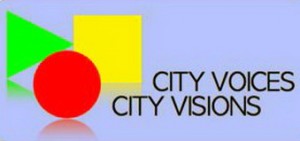Katie Donnelly 
City Voices, City Visions, a teacher-education initiative from the Graduate School of Education at the University at Buffalo, has been providing Buffalo city teachers and students with digital video training since 2000. According to the City Voices, City Visions website:
The ultimate objective of CVCV is fostering student achievement by empowering them with digital video tools for visual/analytic thinking and understanding. To meet this objective, City Voices, City Visions digital video project has three key goals:
- Providing professional development for urban teachers to learn the use of digital video arts and communication technologies to help their students meet higher learning standards in literacy and the academic disciplines;
- Providing greater access for urban students to wise uses of these powerful learning tools by engaging them in innovative curriculum projects to meet challenging academic standards;
- Publishing and archiving the student- and teacher-produced digital videos as curriculum and community resources, including their use in development of present and future urban teachers.
City Voices, City Visions provides summer professional development institutes for middle and high school teachers. These intensive teacher trainings, taught by experienced urban teachers, educate teachers on how to incorporate digital video into their classrooms in both interdisciplinary and subject-specific settings. Teachers use handheld digital video cameras and basic editing software to turn academic concepts into familiar video formats, like public service announcements, movie trailers, news segments, commercials and music videos. Teachers then work with the City Voices, City Visions team to create appropriate classroom assignments, evaluation rubrics, and sample videos specific to the subject matters they are teaching. Over 260 teachers have participated in the program to date.
City Voices, City Visions is evaluated on several levels: through in-class evaluation of student work, student film festivals, and comprehensive academic research. Teachers use the rubrics they create during the summer institute to evaluate the quality of student productions as well as how well students understand subject area concepts. The program also hosts a film festival where external judges evaluate student work. The best are then shown on a big screen, which, according to City Voices, City Visions director, Dr. Suzanne Miller, “gives credibility to student work and affirms students as composers.”
Check out some of the student productions here. ( have to agree with NPR’s Andy Carvin: In the World Today is one of the most powerful.)
Because City Voices, City Visions is affiliated with an academic institution, the program is able to conduct ongoing comprehensive research and evaluation. Most of the research so far has been qualitative, conducted primarily through teacher and student interviews and classroom case studies. Evaluating teachers beyond the confines of the teacher training is key, says Miller, as “not enough research follows teachers out of professional development institutes and into the classroom.”
Through these interviews and case studies, Miller and her colleagues have demonstrated that students who use digital video as a tool for learning are able to successfully “transmediate,” or understand and convey information across multiple media forms. This research has also shown that City Voices, City Vision’s digital video training has an impact on students’ abilities to write essays and understand social studies concepts. Researchers found many examples of students whose use of digital video allowed them to better understand print texts—when students created videos relating to assigned novels, says Miller, “For the first time, they were able to understand what literary text was all about.”
This research also highlighted the many issues facing urban teachers: pressure to teach to standardized tests, lack of administrative support, and technological obstructions and security features. “These issues loom large for urban teachers who are trying to do something innovative,” says Miller. The program is looking to continue working with urban teachers while also expanding into suburban and rural schools. City Voices, City Visions relies on grant funding, and securing funding for this kind of expansion is a challenge. However, scaling the program up to include multiple school districts both in and outside of the city will also the project’s researchers to obtain the kind of large scale quantitative evidence that so many funders still prefer to see.
This article is part of our series on digital and media literacy education initiatives. Previous entries in the series include: PBS NewsHour Student Reporting Lab Program Ready to Expand, FTC’s Admongo Promotes Surface-Level Advertising Literacy, Holocaust Museum Repackages Multimedia Propaganda Exhibit for Media Literacy Educators, Common Sense Media Employs Comprehensive Evaluation Strategy for Digital Citizenship Curriculum, and Digital and Media Literacy Book Review: Spaceheadz.
